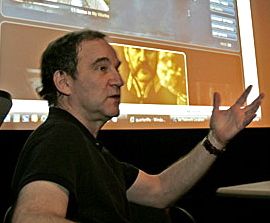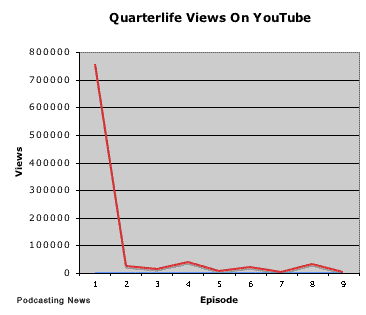quarterlife’s Marshall Herskovitz Talks Smack About Podcasting News, Bloggers & YouTube
Mar 8th, 2008 | By James Lewin | Category: Internet TV, Streaming Video  The LA Times has published an article by thirtysomething creator Marshall Herskovitz that responds to criticism of his show quarterlife, which was hyped beforehand as the first television-quality production for the Web.
The LA Times has published an article by thirtysomething creator Marshall Herskovitz that responds to criticism of his show quarterlife, which was hyped beforehand as the first television-quality production for the Web.
The show bombed on YouTube and went on to bomb on network television.
Despite the show’s poor performance, Herskovitz thinks quarterlife is not just successful, but a hit, and challenges the coverage it has received from Podcasting News, the LA Times and others:
IT was a surreal moment when I learned of the “demise” of my online series “quarterlife” on the front page of Tuesday’s L.A. Times. Mark Twain notwithstanding, reports of said demise are not only premature but laughable.
To be fair, the paper printed a correction the next day, but the error didn’t happen by accident. The headline referred to the Big Picture column by Patrick Goldstein in that day’s Calendar section, and while Patrick didn’t write that headline or the one on latimes.com [” ‘Quarterlife’ Gets a Web Smackdown”], both reflect the sentiments in Patrick’s piece.
Goldstein — whom I like, by the way, and think is a very smart writer — put forth the thesis that “quarterlife” represents a “culture clash” between old and new media, wherein two old media types — Ed Zwick and myself — had “arrogantly” blundered into the new media world with the message that we could do it better, and as a result had received an astonishingly negative response online.
He described charts Podcasting News published about our performance on YouTube as looking “like a graph of Ron Paul’s delegate count” and quoted PN’s claim that we were getting fewer views than “sleeping kitties, graffiti videos or even a clip of Sims in labor.” With no other performance figures cited in the article, one was left to assume that “quarterlife” had in fact tanked on the Internet.
Yes, we did call quarterlife a bomb.
We did say that quarterlife episodes were getting fewer views than “sleeping kitties, graffiti videos and even a video of Sims in labor.”
And we did print a graph that showed the viewing trends for quarterlife on YouTube:

Herkovitz doesn’t really challenge the facts here; instead, he says that they aren’t important.
Herskovitz: YouTube Doesn’t Matter
Herskovitz feels that his show’s performance on YouTube doesn’t matter and that quarterlife is really a hit:
“Quarterlife” has actually been a hit on the Internet, the third most successful scripted show ever (after “Roommates” and “Prom Queen”). We’ve racked up almost 7 million views in less than four months, with higher per-episode averages than either “Roommates” or “Prom Queen.”
The Podcasting (News) quote refers to YouTube, which is not our distribution platform. That’s like going to San Francisco, looking for copies of the Los Angeles Times, and when not finding any declaring the Times a failure.
While Herskovitz may think YouTube doesn’t matter, most people that view videos on the Web would disagree. It’s the top Internet video destination and its view statistics provide a useful tool for understanding what people are interested in watching.
And, while Herskovitz dismisses YouTube and says that the site is not a distribution platform for quarterlife, his actions don’t back that up. quarterlife has an official channel on YouTube that was heavily promoted when the show was introduced.
Herskovitz: Blogs Don’t Matter
Herskovitz goes on to criticize his treatment by Podcasting News, and blogs in general:
Where would you get the idea that we got a “smackdown” on the Internet? My guess is that (LA Times writer Patrick Goldstein) confused “Internet” with “blogosphere,” the blogosphere being a very small subset of the life, opinions and trends that take place online….he was seeing the hothouse world of bloggers as bigger than it actually is.
This is an occupational hazard for old media journalists, many of whom fear the new power wielded by the restraint-less, credential-less Wild West world of the blogosphere, and spend an inordinate amount of time pinging back and forth betwixt online conversations to make sure they haven’t missed anything.
He mentions, for example, an article I wrote on Slate.com some weeks ago, where my arrogance evoked a “fusillade of ridicule.” As an experiment, I went on Slate today and counted the number of comments posted about the article. There were 22, of which 16 were indeed negative (which I felt bad about, and admitted to Goldstein that my tone had been misunderstood). But how many total views were there of this firestorm of criticism, this fusillade? Twenty-eight.
Herskovitz’s hoary criticism of blogs as being a “restraint-less, credential-less Wild West world” comes across as out of touch.
The blogosphere does a decent job of self-regulation – just look at the hit Gizmodo’s credibility took after its CES prank.
Even more important, though, is that Herskovitz’s comments deny a clear trend: people’s attention is moving from old media to new media:
- IBM says that Internet media is rapidly replacing traditional media;
- Most people now rely on the Internet for their news;
- Newspapers are becoming irrelevant as attention moves to the Web;
- The audience for podcasts is growing rapidly;
- Portable media player owners are listening to less radio; and
- Advertisers are moving their money to the Internet.
What Herskovitz trivializes as a “Wild West world” is clearly the future of media.
Herskovitz: quarterlife Is A Hit
Despite his show’s failure on YouTube, despite its bombing on network television and despite the show’s critical reception, Herskovitz considers quarterlife a hit:
“Quarterlife” premiered on NBC last week and performed so poorly it was yanked after one episode. And the reviews by old media television critics — unlike the generally positive reviews for the online broadcast — were the worst we’ve ever received.
I spoke with (the LA Times’) Goldstein twice for his article, and was candid about my pain over the NBC situation as well as the exhilaration of finding myself at my age more comfortable in the new media world than the old. I never knew he had another subject in mind. Because I respect him I find it all the more frustrating that the slant of his article prevented him from posing the most interesting question to emerge from the whole “quarterlife” experiment: How do we define success in a media world so fragmented that the same project can be a triumph in one arena and a failure in another?
While we disagree with many of Marshall Herskovitz’s statements in his article and we’re still a little peeved that he killed off Gary, we can understand his frustration with the challenges of defining success in new media. There really is no consensus, yet, on how to measure success in new media.
But when your show is getting out-viewed by sleeping kitties and videos of Sims in labor, we think it’s safe to say you’ve got a bomb.